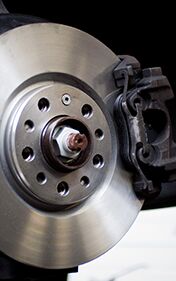What Do Brake Sounds Mean?
Why do your car’s brakes make noise? Whether they screech, squeal, grind, or make another sound, take a look at what these noises mean and when you need to get expert help.
Daily Morning Sounds
Do your brakes make a grinding noise every morning? If you hear this odd-sounding noise first thing in the day, the noise may be completely normal. While grinding in itself isn’t a normal brake noise, some cars may experience this issue due to accumulated moisture.
Rust can build up on the rotors overnight. This can cause a grinding or squealing sound. Normal driving will remove the rust and the noise should go away. If you want to avoid this issue, park your car indoors (in the garage) — especially when it rains, is humid outside, or snows.
If the sound persists throughout the day, rotor rust probably isn’t the culprit. A qualified mechanic can assess the situation, evaluate the brakes (and rotors), and make necessary brake repairs.
Brake Wear Sounds
Do your brakes squeal often during normal use? Before you try some fancy guesswork, ask yourself when the last time you changed the brake pads was. If you’ve never changed the pads, and your car isn’t new, a squeal can indicate it’s time for a new set.
The brake pad wear indicator in most cars is made from steel. When it hits the rotor you hear a squeal or squeak. Worn pads are ineffective and dangerous to drive on. If you hear this sound, it’s time for service. A qualified auto mechanic can inspect the brake pads for wear and replace them.
Vibration Sounds
Do your brakes rattle or vibrate? A worn or warped rotor may be at fault. This creates an uneven surface that doesn’t allow the brake to fully contact the rotor. Again, you’ll need a qualified mechanic to repair this issue. Never attempt to adjust or move the rotor or brake pads yourself. This can lead to more problems or a dangerous situation.
Dusty Squealing Sounds
Do you have a buildup of brake dust? If you aren’t on top of your car’s maintenance or have an excessively dirty car, dust can build up and lead to strange sounds.
Brake dust typically causes a squealing sound, and won’t result in grinding, vibrating, or banging noises. If you hear a loud or grinding sound, chances are you have a more serious problem. An auto mechanic in Tucson can inspect your brakes to determine if dust is at fault. The mechanic can also clean your brake’s shoes and drums. This leaves them almost dust-free and should eliminate the noise.
Brake Fade Sounds
Do your brakes feel like they’re about to fail? If the noises accompany inconsistent activity, brake fade is a possible culprit.
Brake fade happens when the brakes overheat. This can happen when you have new pads or rotors installed (the parts may need time to settle and align properly), the wrong brakes or rotors installed, or overheating brake fluid.
While the noise and reduction in stopping power may only happen intermittently or temporarily, this is an issue you need to address immediately. Anything that interferes with your car’s ability to stop poses a potential danger. If you think brake fade is at fault for your car’s problem, contact a mechanic for a full evaluation and repair.
Debris-Related Sounds
Do you hear a sudden grinding noise? Even though grinding is often a first thing in the morning issue, it can also indicate another problem. If your brakes suddenly start to grind, a pebble or other road debris may be trapped inside. This, like other non-moisture-related grinding noises, requires a professional’s evaluation and repair.
Are your brakes noisy? Contact BRAKEmax for more information.
